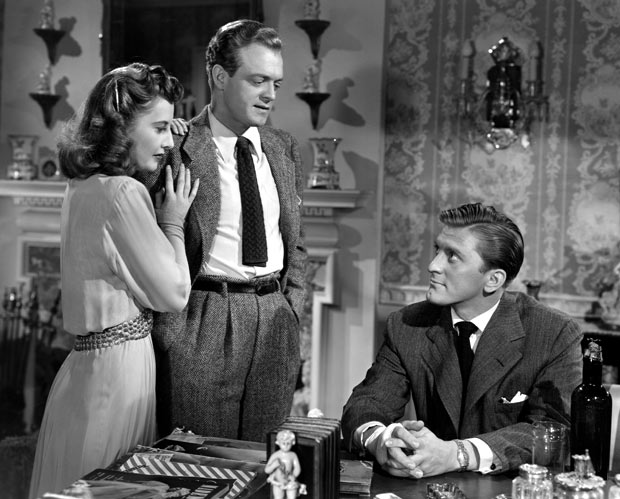Directed by Lewis Milestone

What is there to say about The Strange Love of Martha Ivers? Seriously, what do I say? I got nothing.
Well, that’s where most of these write ups start, and by the end I’ll come up with a point of view. Strange Love is a love triangle of a story with various twists and turns. It’s the film debut of Kirk Douglas, playing the same conniving, haunted character he seems to have played many times over in his career (Ace in the Hole, The Bad and the Beautiful). Here he is ostensibly the bad guy… until he’s the good guy… until he’s the bad guy again… until he’s just an innocent caught up in a bigger scheme?
This film is centered around the romance between titular Martha (Barbara Stanwyck), her childhood love Sam, and her eventual husband, Walter (Douglas). The film opens with young Martha on the run alongside Sam. They’re madly in love with plans to run away together. Immediately they are caught, and she is returned to her evil-ish aunt. When said evil-ish aunt attempts to beat Martha’s cat, Martha grabs her aunt’s cane and strikes her, killing her.
The incident is witnessed by young goody two shoes Walter. When Walter’s father, Martha’s tutor, asks what happened, he upholds Martha’s lie that someone else did it. Suddenly we fast forward 17 or 18 years.
Sam, who ran away that night, has returned to town. He learns that Walter and Martha are now married and that Walter is the town district attorney. Martha runs a large business empire and does not love her husband who drinks away most of his days, guilty over the way he and Martha sent an innocent man to the grave as the supposed killer of Martha’s aunt.
So Sam returns to town and meets a new woman, Toni. When she is arrested for breaking her probation, Sam turns to Walter to help get her out of jail. Walter is either jealous or suspicious or both. He thinks Sam plans on blackmailing him, so he jumps the gun and persuades Toni to take part in a plan to frighten Sam out of town. This plan includes a brutal beating, and it works, at least until Toni confesses the plan to Sam.
Okay, so I kind of forget what happens next. The film keeps switching between protagonists. First Walter is the paranoid one whose decisions drive the story, but then Sam takes over, torn between his love for Martha and for Toni. The film takes some time to explore their relationship as they consider running away together, and they lament the life they never shared.
Finally Martha takes over, which makes sense considering the film includes her in the title. During a confrontation between the two men and her, Walter drunkenly falls down the stairs, and Martha encourages Sam to kill him. Sam decides not to, and then when Walter wakes up, she points the gun at Sam, believing he might actually blackmail them.
Sam calls her bluff and leaves. As he’s outside, we see Walter point the gun at Martha, and then she helps him pull the trigger, effectively committing suicide. After that, Walter kills himself.
The movie ends with Sam and Toni leaving town together.
Okay, so, a lot happened. This is a melodrama, right? It feels like a violent melodrama. The film centers on the guilt of two characters as they covered up a murder in their childhood. The lingering feelings from this traumatic event make sense. Then you have their unhappy marriage, effectively arranged at a young age by Walter’s father. While Walter spends his days remembering his role in covering up a murder and sending an innocent man to hang, Martha laments her and Walter’s marriage as if it’s her own death sentence. They are both characters hung up on the past, and in the end death offers them the only release from their inner turmoil.
What’s most interesting about this film is the way it introduces characters to fill out a suspected role but who then subvert that role. Sam is ultimately the good guy. He’s the man we most want to be like, who makes the right decisions and expresses the right amount of sympathy. He’s also the outsider, the one whose return to the town of Ivers leads us back into the story.
You’re led to think that Sam is the outlaw and that Walter and Martha are the civil heroes, the good ones. As the story goes on, however, Walter and Martha unveil their deep seated guilt, remorse and anger. They are haunted figures, hiding in plain sight, and I suppose it takes somewhat of an outsider to come in and expose them.
So is that what this is about? Flipping character expectations? The Strange Love of Martha Ivers is a solid movie and a good title. It’s kind of a ‘B movie’ title, and her “strange love” is certainly what drives the story. It’s what compels her to cover up the murder of her aunt, which indirectly leads to her unhappy marriage, which leads to a bitterness that almost kills her husband, which eventually leads to her own death. It’s one of those movies in which the characters seem to be going down a doomed spiral. There is no way out, except for the character who only recently found his way in.
Up Next: The Naked Kiss (1964), Wall-E (2008), Phantom Thread (2017)

My all time favorite movie!!! I love kirk douglas he was damn handsome!!
LikeLike